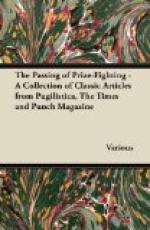ALGOL.
* * * * *
[Illustration: MORE ADVENTURES OF A POST-WAR SPORTSMAN.
P.-W.S. (having struggled over many ploughed fields). “NOW THEN, MY LAD, FETCH ’IM OVER ’ERE AND I’LL GIVE YOU A TANNER.”
Bucolic Profiteer. “NOA, YE DOAN’T! GIVE OI TEN BOB OR OI LETS HE GO AGAIN.”]
* * * * *
OUR BOOKING-OFFICE.
(By Mr. Punch’s Staff of Learned Clerks.)
We are apt to think of Lord NORTHCLIFFE as the “onlie begetter” of the New Journalism. But here comes Mr. KENNEDY JONES, M.P., to remind us, in Fleet Street and Downing Street (HUTCHINSON), that he too had a very large share in its parentage. And up to a point he is a proud father. Circulations reckoned in millions instead of thousands, journalistic salaries raised from hundreds to thousands, advertisement-revenues multiplied many-fold— these are some of the outward signs of the success of a policy which the author summarised when he told Lord MORLEY, “You left journalism as a profession; we have made it a branch of commerce.” But there is another side to the medal. Frankenstein’s monster was perfect in everything save that it lacked a soul. In all material things the New Journalism is a long way ahead of the Old; and yet, after chronicling its many triumphs— culminating in the capture of The Times—its part-creator is fain to admit that “public distrust of news is the most notable feature in journalism of recent years,” and that the influence of the daily Press on the public mind has hardly ever been at a lower ebb. This frankness is characteristic of a book which on nearly every page contains something to startle or amuse. The author’s experiences on his first day in London, including an encounter with a sausage-seller (more friendly than CLEON’S rival); his negotiations for the purchase of The Times, and his offer of the editorship to Lord CURZON, who unfortunately refused it; the provenance of “The Pekin Massacre,” which originated, it appears, not with a “stunt” journalist, but with a Chinese statesman wishing to pull the Occidental leg—these and many other incidents are admirably described by a writer who, though he long ago doffed his journalistic harness, has not forgotten how to write up a “good story.” Be your opinion of the New Journalism what it may I guarantee that you will find its champion an agreeable companion.
* * * * *
There are parts of Mr. W.J. LOCKE’S latest novel, The House of Baltazar (LANE), which will, I fear, make almost prohibitive demands upon the faith (considered as belief in the incredible) of his vast following. To begin with, he introduces us to that problematical personage, whose possibility used to be so much debated, the Man Who Didn’t Know There Was A War On. John Baltazar had preserved this unique ignorance, first by bolting from




